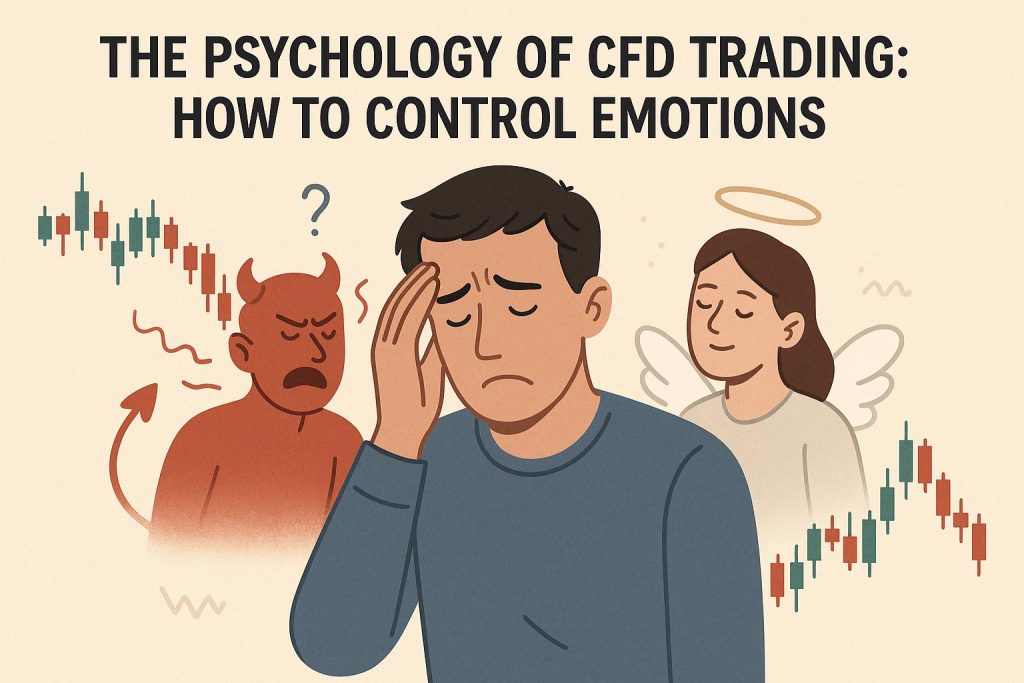The Psychology of CFD Trading
Contracts for Difference (CFD) trading has gained popularity, primarily because it offers the potential for substantial returns with a comparatively low capital requirement. However, it is not devoid of challenges, especially psychological ones. These challenges can significantly influence decision-making processes. Recognizing and controlling emotions is essential in CFD trading, as this helps maintain a rational mindset and prevents potential losses.
Understanding Emotions in Trading
Traders, like any human beings, are not immune to emotional influences. Two predominant emotions, fear and greed, can heavily steer trading decisions in unintended directions. Fear often manifests as a compelling urge to sell off positions too early to avert possible losses or cling to underperforming assets in the hope of a market turnaround. Conversely, greed can push traders to undertake imprudent risks with the allure of larger profits.
The Role of Fear in Trading
Fear is primarily driven by the expectation of loss. This anticipation can cause traders to prematurely offload assets at a loss instead of methodically evaluating the circumstances. Overcoming fear involves a commitment to long-term objectives while acknowledging that market fluctuations are an inherent part of trading.
Understanding Greed Influence
Greed is a double-edged sword that can result in overextending positions, occasionally disregarding reliable trading strategies. To counter greed’s effects, traders should establish lucid profit targets and adhere to disciplined exit protocols.
Strategies for Controlling Emotions
The successful management of emotions is vital for CFD trading. Below are some strategies traders can employ:
1. Develop a Trading Plan
A well-structured trading plan is a cornerstone for maintaining focus and uniformity in trading activities. This plan should detail specific entry and exit points, implement firm risk management strategies, and highlight clearly defined objectives. A trading plan acts as a buffer against emotional biases, aiding in more disciplined decision-making.
2. Use Risk Management Techniques
Utilizing sound risk management techniques, like stop-loss and take-profit orders, can shield traders from substantial losses while ensuring that profits are secured. These measures are instrumental in mitigating emotional responses to market dynamics.
3. Maintain a Trading Journal
A trading journal serves as a valuable tool for reviewing past trades, discerning emotional reactions, and recognizing decision-making patterns. Through consistent analysis of the journal, traders can learn from past missteps and fine-tune their strategies effectively.
The Importance of Psychological Resilience
CFD trading requires substantial psychological resilience. Traders must gear up for the challenges and setbacks intrinsic to the trading landscape.
Staying Objective
Maintaining objectivity is paramount in trading. Traders ought to prioritize market data and analytical insights, steering clear of decisions based purely on instincts or external influences. Taking regular breaks and limiting the urge for incessant market monitoring can help in maintaining objectivity.
Education and Continuous Improvement
Continuous education plays a pivotal role in keeping traders well-informed about market trends and trading strategies, allowing them to make well-considered decisions. Participating in forums or attending webinars can further enrich traders’ understanding and provide them with valuable support.
Building Emotional Resilience
Fostering emotional resilience entails managing stress proficiently and finding a sustainable balance between trading activities and personal life. Practices such as mindfulness or meditation can be incredibly beneficial in achieving a composed mental state.
Through the dedicated application of these strategies, traders can better manage their emotional responses, thereby enhancing their proficiency and success in CFD trading. For further reading on trading psychology, visit Investopedia.
Beyond understanding the direct psychological factors at play, it is essential for traders to appreciate the contextual elements that influence emotional states. Trading environments, news events, and social pressures can exacerbate emotional triggers like fear and greed, prompting rash decisions. Awareness of these external factors and implementing strategies to mitigate their impact is equally vital.
Evaluating Trading Environments
The immediate trading environment can impact decision-making processes. Factors such as market volatility, global events, and economic indicators play substantial roles in shaping emotional states and trading behaviors. Successful traders actively accommodate these factors, adapting their strategies in response to changes rather than reacting emotionally.
Managing News Consumption
News and media can be double-edged swords, providing critical information while also creating unnecessary anxiety. It is crucial for traders to cultivate discernment in news consumption, focusing more on data-driven insights rather than sensationalized reports. An educated approach to news can prevent hasty decisions fueled by short-term market panic.
Establishing Support Networks
Developing support networks within trading communities provides traders with different perspectives and emotional support. Interaction with peers can help lessen the psychological burden of trading alone and foster a collaborative approach to learning and problem-solving. Moreover, engaging with seasoned traders can offer invaluable guidance and mentorship.
Promoting a Disciplined Lifestyle
A disciplined lifestyle goes hand-in-hand with effective trading. Practicing regular exercise, maintaining a healthy diet, and ensuring adequate rest are lifestyle choices that promote mental clarity and emotional stability, which are essential for sound trading decisions.
Utilizing Technology Wisely
Technology offers numerous tools to assist traders in making objective decisions, from automated trading systems to analytical software. Leveraging technology wisely can reduce the emotional weight of decision-making, allowing traders to focus on strategy and execution.
In conclusion, the psychology of CFD trading is multifaceted, necessitating a diligent approach to emotional management. By understanding emotional influences, establishing clear strategies, and maintaining a balanced lifestyle, traders are equipped to navigate the complexities of the trading world with greater confidence and success. For an enhanced understanding of CFD trading strategies and emotional insights, consider continuous education and engagement within trading communities.
This article was last updated on: October 9, 2025







